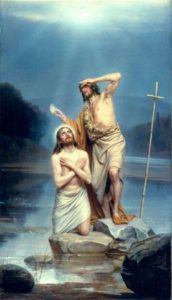Part I: The Adventure of the Hero

Chapter 4: The Keys
“The Keys” was a commentary on how myths have become watered down in many different traditions today. But the poetry of mythology is ruined when one considers these texts as scientific or historical – as it is easy to invalidate mythology under those frameworks. The rites and symbolism that exist shouldn’t be regarded as mere superfluous detail, but of primary importance.
The key images in mythology are often hidden and considered secondary because of society’s transition from the mythological to the secular perspective. This is a mistake as the potency of the older images is compromised, the life is taken out of the mythology, and “temples become museums.”
Campbell shows that baptism in Christianity carries a deeper meaning that how it is remembered today. Jesus’ words illustrate the importance of baptism spiritually.
“Verily, verily, I say unto thee, Except a man be born again, he cannot see the kingdom of God.”
Nicodemus said to him “How can a man be born when he is old? can he enter the second time into his mother’s womb and be born?” Jesus answered “Verily, verily, I say unto thee, Except a man be born of water and the spirit, he cannot enter into the kingdom of God.”
Baptism is popularly interpreted as “washing away original sin.” However, the idea of cleansing should be considered as being of secondary importance. The main consideration is symbolic, and marks the beginning of the spiritual journey – which properly begins when all of implications of the symbolism is followed through.
“The female water spiritually fructified with the male fire of the Holy Ghost is the Christian counterpart of the water of transformation known to all systems of mythological imagery. This rite is a variant of the sacred marriage, which is the source-moment that generates and regenerates the world and man…”
If you are interested in reading books about unmasking human nature, consider reading The Dichotomy of the Self, a book that explores the great psychoanalytic and philosophical ideas of our time, and what they can reveal to us about the nature of the self.